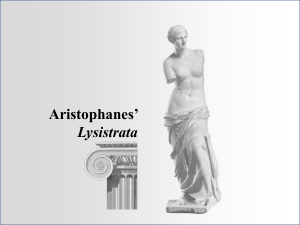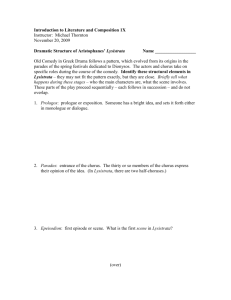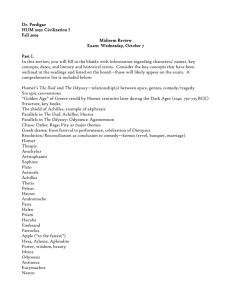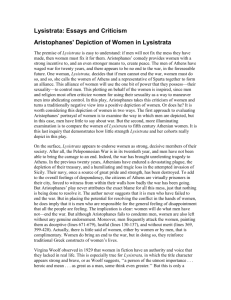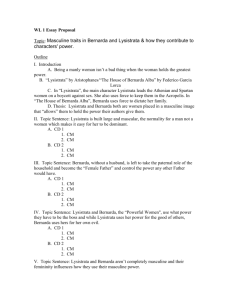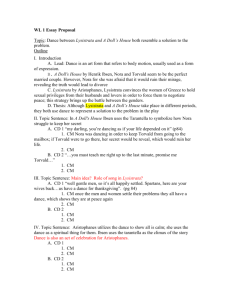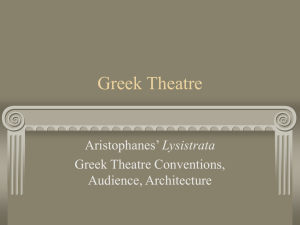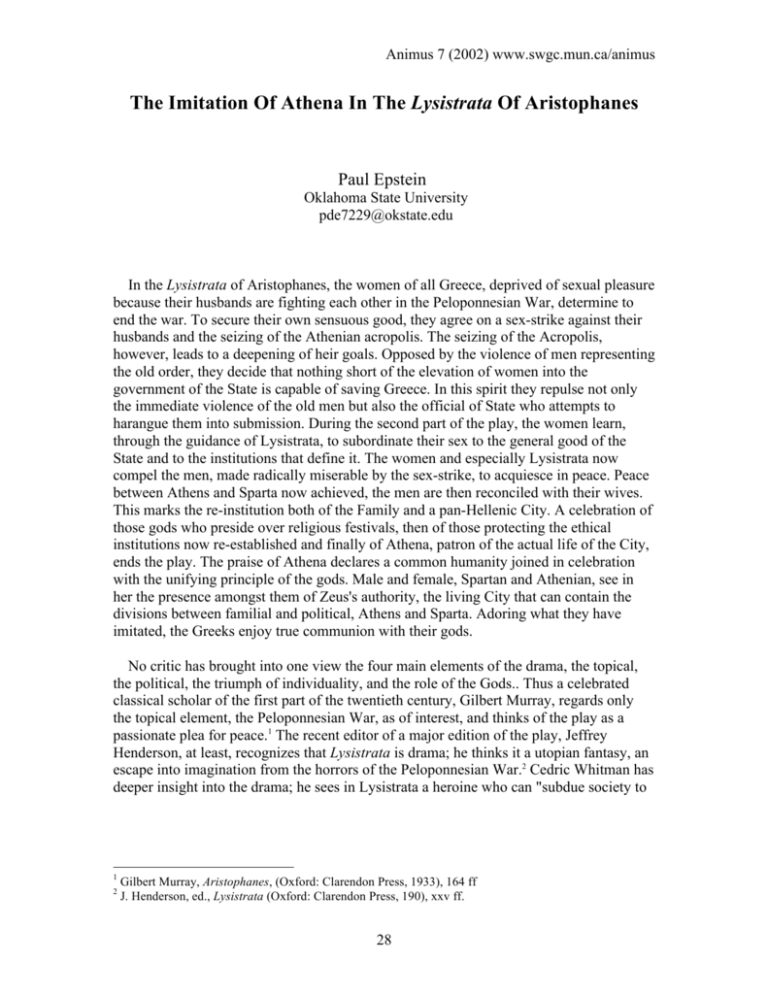
Animus 7 (2002) www.swgc.mun.ca/animus
The Imitation Of Athena In The Lysistrata Of Aristophanes
Paul Epstein
Oklahoma State University
pde7229@okstate.edu
In the Lysistrata of Aristophanes, the women of all Greece, deprived of sexual pleasure
because their husbands are fighting each other in the Peloponnesian War, determine to
end the war. To secure their own sensuous good, they agree on a sex-strike against their
husbands and the seizing of the Athenian acropolis. The seizing of the Acropolis,
however, leads to a deepening of heir goals. Opposed by the violence of men representing
the old order, they decide that nothing short of the elevation of women into the
government of the State is capable of saving Greece. In this spirit they repulse not only
the immediate violence of the old men but also the official of State who attempts to
harangue them into submission. During the second part of the play, the women learn,
through the guidance of Lysistrata, to subordinate their sex to the general good of the
State and to the institutions that define it. The women and especially Lysistrata now
compel the men, made radically miserable by the sex-strike, to acquiesce in peace. Peace
between Athens and Sparta now achieved, the men are then reconciled with their wives.
This marks the re-institution both of the Family and a pan-Hellenic City. A celebration of
those gods who preside over religious festivals, then of those protecting the ethical
institutions now re-established and finally of Athena, patron of the actual life of the City,
ends the play. The praise of Athena declares a common humanity joined in celebration
with the unifying principle of the gods. Male and female, Spartan and Athenian, see in
her the presence amongst them of Zeus's authority, the living City that can contain the
divisions between familial and political, Athens and Sparta. Adoring what they have
imitated, the Greeks enjoy true communion with their gods.
No critic has brought into one view the four main elements of the drama, the topical,
the political, the triumph of individuality, and the role of the Gods.. Thus a celebrated
classical scholar of the first part of the twentieth century, Gilbert Murray, regards only
the topical element, the Peloponnesian War, as of interest, and thinks of the play as a
passionate plea for peace.1 The recent editor of a major edition of the play, Jeffrey
Henderson, at least, recognizes that Lysistrata is drama; he thinks it a utopian fantasy, an
escape into imagination from the horrors of the Peloponnesian War.2 Cedric Whitman has
deeper insight into the drama; he sees in Lysistrata a heroine who can "subdue society to
1
2
Gilbert Murray, Aristophanes, (Oxford: Clarendon Press, 1933), 164 ff
J. Henderson, ed., Lysistrata (Oxford: Clarendon Press, 190), xxv ff.
28
EPSTEIN: THE IMITATION OF ATHENA IN THE LYSISTRATA OF
ARISTOPHANES
her ends" and does so by restoring peace and domestic integrity, remaining within
society, however, and experiencing no apotheosis.3
That none of these views can do justice to the particularities of the plot indicates the
need for a broader view. Thus while Murray rightly sees the Peloponnesian War as the
external occasion for the play he does not show how the sex-strike, the assertion of
female independence, and the final reconciliation of the sexes realize the peace that he
says the drama pleads for. Henderson exposes the weakness of this 'topical' theory by
speaking of the action as fantasy. Yet why the fantasy assumes the form it does, the
reconciliation of essential elements of Greek Society and religion he does not say.
Whitman sees clearly that the drama depends on the action of the comic hero, here a
woman with a revolutionary plan. The individuality that he attributes to her, however,
that of one who can 'subdue society to her ends' belongs more to our own time that to the
fifth century B.C.. Whitman's view accounts for the first part of the play, the initial
statement and triumph of the women's programme. Lysistrata's development in to an
Athena-figure is beyond Whitman's insight.
The seventh of Aristophanes' extant plays, Lysistrata was presented in 411 B.C. and
partakes of those characteristics that differentiate the plays after Birds from those before.
All the plays show the history of a representative Athenian who having sought first to
subject his city's institutions and religion to some natural good of his own, then learns
that his participation in the life of the City depends rather on a reason that can govern this
passion. The form in which the hero seeks to make the life of the city his own gives to
each play its peculiar character.
In the plays before Birds (the sixth of those extant) the central character feels alienated
from a particular aspect of the City's life, and his struggle with this alienation determines
his relation to the essential spheres of life. In Clouds, for example, Strepsiades feels
oppressed by the extravagance of his son and wife; this leads him to educate his son in
sophistry as a means whereby he can avoid this son's debts. The son, educated in
sophistry, then turns against his own family; Strepsiades thereupon repents of what he has
done and again affirms the gods whom sophistry has denied, and the institutions which
they support.
Clouds, then, begins with an oppression not universal at Athens, but peculiar to
Athens. Strepsiades' attempted solution to this leads to sophistry, which is a more general
phenomenon, but not specifically related to any of the established institutions of the City.
The result, a general affirmation of the gods and the City, is of a very partial kind. On the
one hand, the hero's allegiance to the gods is now explicit, and not customary.
Nevertheless since the subjectivity thus asserted is initially mediated by a very particular
question, it does not threaten the established order of the gods or the city. Strepsiades
does experience what the gods cannot, first a deviation from the order and then a return to
3
Cedric Whitman, Aristophanes and the Comic Hero (Cambridge: Harvard University Press, 1964), 201.
29
EPSTEIN: THE IMITATION OF ATHENA IN THE LYSISTRATA OF
ARISTOPHANES
it. However, the sphere in which this has arisen is not the total domain of the gods, the
entire city, but a particular sphere within it.
In Birds this alienation from the City is felt as total, and the overcoming of this must
likewise be total. Disgusted with Athens as a whole, the hero first seeks to find his wellbeing by building a city of the birds, a nature-city. When this proves unstable, he
gradually realizes that only a city founded on a deeper reason can include nature within it.
The hero, and through him the spectator, has experienced first a natural turning away
from the existing city as a whole and then a development from this alienation, to a reappropriation of the whole city. This means that the hero has a deeper sovereignty over
the city than even Zeus, whom Greek religion has presented as that god who ultimately
rules not only the universe but also the human city. Thus the play can end with the
transfer of sovereignty from Zeus to the mortal hero, now hailed as highest of gods.
Birds might appear then as the literal completion of Aristophanes's poetic enterprise. If
the education of a representative human being can end in his displacement of the highest
god, then a true account of humanity and its relation to religion has been discovered, and
nothing more need be said. However, the same indeterminacy that has allowed the
'overthrow' of Zeus also allows the comic relation of man to the gods to assume other,
more complete forms. That is, since the reigning Olympian gods are imagined to have
developed out of the Titans, no particular god is absolute in the sense that God as
understood by the Jews is. Nor is this the perception of Comedy only. In the Prometheus
trilogy of Aeschylus, the title character knows that if Zeus has a son by a certain mortal,
that son will overthrow him, that is, better unite divinity with men. Thus the 'overthrow'
of Zeus in Birds is the occasion for the poet to imagine a deeper clarification of the
divine-human relation. In this way the relation of humanity to Athena becomes his theme.
Born from Zeus's head, she presides over practical wisdom, and as the name Athens
implies, she is the animating spirit of the life of the whole City. A humanity capable of
imitating her will have a deeper life than even one that can imitate Zeus.
In outline, Lysistrata has the following form. The long continuance of the
Peloponnesian War, as noted above, has deprived Greek women of sexual pleasure.
Deliberation convinces a pan-Hellenic assembly of them summoned by Lysistrata to
decide on a sex-strike against their husbands. Thus from the beginning of he play there is
pan-Hellenic agreement amongst all women, but a division within each of the two
warring cities, Athens and Sparta, between men and women. The remainder of the first
part of the play shows the sharpening of this division at Athens. The women's seizure of
the Acropolis, to secure the money intended for the prosecution of the war, summons
forth the extreme hatred of the old men who had fought at Marathon and regard the
women as traitors to the City. They and an official arrived to control the women, regard
them as having no say in matters of war. The first part of the play ends with the women
saying that war is their care only and in possession of the field, but having not by any
means convinced the men of this. The second half of the play shows the reconciliation of
the sexes. The women again desire their husbands, and only Lysistrata can persuade them
to restrain themselves. When one wife repulses her sexually desperate husband, victory is
30
EPSTEIN: THE IMITATION OF ATHENA IN THE LYSISTRATA OF
ARISTOPHANES
in sight. Spartan and Athenian, alike immobilized by passion, agree to accept the
arbitration of Lysistrata. She recalls all the men to their common religion and history and
then reconciles them to their wives. Finally, restored to political unity and family life, all
hymn those gods Zeus, Hera, and Athena whose spheres of being the action has made
real.
The play begins as the Athenian Lysistrata awaits the arrival of women whom she has
summoned from all Greece. Even when called to so momentous an assembly, the women,
obedient to their usual habits, are slow in coming. Their eventual arrival constitutes a
pan-Hellenic sisterhood that transcends the sharp difference between Athens and Sparta,
now so evident in war. Because Lysistrata, whose name means destroyer of armies, hopes
that the community of women can end the war, a strong opposition between men and
women will define the action of the play.
The women's desire for peace arises from their being deprived of sexual pleasure. First,
says Lysistrata, husbands vanished, then adulterers, but the embargo on imported dildos
has proved decisive; strong action is necessary to end the war and restore their pleasure.4
As in every Aristophanic comedy, the action begins with the central character's feeling
oppressed by the current state of life in the polis, in some aspect of his natural well-being.
To be freed of that oppression, the character must control that state of life. Here the entire
female sex aims at governing all Greece. At first, the women respond enthusiastically to
Lysistrata's appeal and say that they will do anything to end the war; their heroism
reaches such a peak that one woman says she would even be cut in two, if it could bring
peace. Another agrees to any abstinence in order to compel the men to make peace.
When, however, Lysistrata says that they must all abstain from the penis, the women turn
away in horror. One explains her reluctance by declaring that since there's nothing like it,
she would rather go through fire than endure such an abstinence.5
The Spartan Lampito has more spirit, however, than the others and agrees to
Lysistrata's plan. This gives Lysistrata the opportunity to convince the other women that
difficult as it is, a sex-strike will quickly compel their husbands to make peace. Although
the women do not speak of it, a certain contradiction is present in their plan to abstain
from sex in order to later enjoy it. The necessity of abstaining from sexual pleasure shows
that the women do have in fact a deeper goal perhaps than its restoration. This appears in
the subsequent scene which shows the women's belief that only the transfer of
government into their hands can rescue Greece from ruin. Lampito wonders, though, how
the Athenian men, so long as they have their navy, can ever be induced to make peace.
Lysistrata has not been remiss in her planning. The older women, she says, have been
directed to seize the acropolis, and the money kept there for the building of ships.
Thereupon all the women swear an oath to pursue Lysistrata's scheme. Thus the women
set themselves against an order in which men have the power of decision in both Family
and State, to restore both peace and sexual pleasure.
4
5
Lysistrata 99-101, 107-112.
Lysistrata 133-135.
31
EPSTEIN: THE IMITATION OF ATHENA IN THE LYSISTRATA OF
ARISTOPHANES
As Lampito leaves to inspire the Spartan women to practice abstinence from the joys
of Aphrodite, the Athenian women have meanwhile seized the Acropolis. By seizing the
Acropolis, they seize the very center of Athenian political and religious life, as well as its
source of funds. The pan-Hellenic sisterhood thus has shown itself capable of wideranging political activity; it has begun the unification of Greece from an altogether new
standpoint.
As the old women seize the Acropolis, a chorus of old men with a different vision of
Greece now opposes them.6 These had helped to expel the tyrant a hundred years before
and fought at Marathon to protect Greece from the Mede; they represent the historical
basis of the State heretofore. The men are naturally outraged at the women's having
seized the Acropolis. They can regard the women only as criminals worthy of death and
thus attempt to burn them.
Having failed in their violent attack, the men summon a Proboulos, who manages the
finances necessary to the prosecution of the war.7 In his encounter with the women, his
office proves no guarantee of sense. He imagines that their behavior arises from men's
having indulged their sexual desires; he thus thinks that force alone is the suitable method
for dealing with them. When he directs his Scythian archers, however, to arrest the
women, the latter repulse them with ease.
Although he agrees to a discussion with the women, he understands nothing of their
argument. He can only insist that matters of war and peace are not the concern of women.
Lysistrata indicates why this view can no longer prevail. For too long, women have tried
to influence their husbands quietly and to dissuade them from the policies that have led to
the current ruinous war, only to be curtly rebuffed by them. Therefore, women have now
taken action, and their domestic qualities, she argues, will make them adept at managing
the affairs of state. Lysistrata further indicates that as mothers, wives and lovers, the War
has been especially hard on them. Old men can always marry, she says, while young
girls, once they pass their season, must remain forever unwed.
The exchange with the Proboulos shows a deepening of the women's interests. They
agitate now not for a restoration of sexual pleasures but for all the interests of women.
They speak of restoring peace, but from the standpoint of their own sex. They do not see
the men as ethical persons with a standpoint of their own, but as obstacles to their wellbeing, just as the men, represented by the Proboulos, regard them.
The Proboulos is incapable of sympathy; he can only respond that no man who has not
lost his virility ever suffers sexual deprivation. He regards women not as wives or
mothers but as the merely animal objects of men's desires.Thus the women see that they
can treat men, at least now, only as their enemies. They dress the Proboulos as a corpse,
6
7
Lysistrata 254 ff.
The Proboulos enters at 387.
32
EPSTEIN: THE IMITATION OF ATHENA IN THE LYSISTRATA OF
ARISTOPHANES
therefore, and prepare him for burial.8 In so doing they take his contempt for them one
step further. They regard him not only as merely an animal, but a dead one.
The play has seen a significant movement of the women toward their being the
political governors of the State. From the beginning they appear as the entire sex of
women. Their initial search is for the restoration of that sexual pleasure that the War has
deprived them of, and to this end they undertake, contradictorily enough, a sex-strike
against the men. For their own ends then they rebel against men as the (patriarchal) heads
of families. The Athenian women's seizure of the Acropolis, however, leads to a deeper
conflict with men and a deeper assertion. Here they announce their refusal to accept the
government of men as citizens. War is the business of women, they declare, and only
their government of the City can save it.
After the Proboulos has departed, the opposed reflections of the male and female
choruses take the place of the traditional parabasis.9 The men look with horror at the
women's having co-operated with the Spartans, and consequently think of the women as
plotting a tyrannical revolution within the state. For their part, the women lay claim to an
equal share in the management of the State's affairs and recall the parts they have taken,
since childhood, in the various festivals the City has celebrated.
That the women have not been dislodged and that the men still oppose them shows a
sharp division within the State. Neither the men nor the women can rationally claim as a
sex to constitute the State. If the behaviour of the men in waging war without regard to
the welfare of the women had implied their claim to alone constitute the State, the women
have now for their part made a directly opposite claim.
Thus the play does not end simply with the victory of sisterhood. Rather Lysistrata
leads them to a victory they had not dreamt of. Neither the erotic bliss that they had
originally sought nor the reign of women that they had later declared, will be their goal.
Rather a capacity for governing their sexual passions will make first them and then their
husbands capable of political life, the restoration of the disrupted family, and the
celebration of those gods they have imitated.
The action has four main divisions. First, Lysistrata dissuades the women from
returning home so that they might again enjoy the embraces of their husbands.10 Second,
a representative woman rejects the appeal of her husband to become again a wife and
mother.11 Third, the men of all Greece, disabled by their sexual passions, allow Lysistrata
8
Lysistrata 599 ff.
Lysistrata 614-705. Hereafter the choruses do not so much advance the action as reflect the development
accomplished in others.
10
Lysistrata 706-780.
11
Lysistrata 829-953.
9
33
EPSTEIN: THE IMITATION OF ATHENA IN THE LYSISTRATA OF
ARISTOPHANES
to dictate a peace.12 Fourth, the men are restored to their wives, and all hymn the gods
who define the life of the City.13
The first scene after the parabasis shows various women leaving the Acropolis and
going home. When questioned about why they are leaving, they allege various domestic
responsibilities. According to Lysistrata, however, all that they say is mere pretext, and
they are in a frenzy of sexual desire for their husbands. Lysistrata is able to restrain the
women only through an oracle which declares that Zeus will establish peace only if the
women abstain from sexual relations. The women accept this oracle and agree to continue
with their enterprise.
This marks the turning-point of the women's career. They no longer pursue their
interests simply as women, but act for the whole City and its good; this represents, at the
same time, an imitation of the various Olympian gods who preside over the essential
spheres of life. Here, for example, when Lysistrata exposes what the other women have
said as mere pretext, she has shown the distinction between the imitation of Aphrodite
and that of Hera; the former presides over the attraction of men and women for each
other, the later over their marital union. Only at the end of the play are those gods openly
invoked whom the humans have earlier imitated.14
The next scene tests and deepens the women's ability to exercise that dominion over
their passions which Lysistrata has taught them. They learn that the men desire them
more than they desire the men, when a certain Cinesias, husband of one of the women,
approaches. Lysistrata urges his wife Myrrine, to tease him, leading him on, but not to
yield. She agrees readily; the women have determined to contain their sexual desire, and
now Myrrine will show that this resolve has become real in them.
Cinesias's sole interest, as his name implies, is to satisfy his sexual desires. He appeals
to his wife's maternal instincts, however, bringing their small child with him and showing
the neglect it has suffered through its mother's absence. He even appears willing to make
peace with the Spartans when Myrrine insists on this as a condition of their sexual union.
When Cinesias, however, imagines himself secure of his wife's affections, he turns vague
when asked what he intends to do in the assembly about securing a peace. Myrrine
thereupon runs away, leaving her husband to bemoan the miserable state to which
unsatisfied sexual longing has reduced him.
Although this scene has necessarily shown the effects of the strike on one man and one
woman at Athens, the facetious names of the pair (Myrrine and Cinesias) show that each
represents his entire sex. Thus the scene shows that the women of Athens have arrived
both at a Zeus-like knowledge that all goods must be subordinated to the political
community, and the capacity to act on that knowledge. Their husbands have shown
12
Lysistrata 1072-1188.
Lysistrata 1273-1321.
14
As noted above, Whitman denies that Lysistrata experiences apotheosis. However, here it is clear that
both she and the women begin that imitation of the gods which is the very definition of apotheosis.
13
34
EPSTEIN: THE IMITATION OF ATHENA IN THE LYSISTRATA OF
ARISTOPHANES
themselves to be governed, on the contrary, by natural passions of a sub-Olympian kind;
no Olympian deity presides over sexual passion simply. Those under the aegis of
Aphrodite are moved in some measure by mutual attractiveness, of which the best human
example is the love affair of Paris and Helen. Cinesias has not attained even to this kind
of mutuality.
The arrival of a Spartan herald, his state of sexual excitement by no means invisible,
shows that the Spartans also suffer what in Cinesias Athenian men are seen to suffer. The
two sides thereupon agree to treat for peace. Neither good will nor an eirenic spirit but
their common sexual suffering first unites them and compels them to begin those talks
which will end the war.
The Spartan ambassadors accordingly arrive, and they commiserate with their
Athenian counterparts about the sexual tension that they both suffer. The Athenian indeed
regards his countrymen's situation as so desperate that they will have to f*** Cleisthenes,
a reputed pathic15 All agree that only Lysistrata can so restore peace that they can all be
freed from their currently unfilfillable passions. Upon her appearance she produces
'Reconciliation,' here personified as a young woman. Then she declares her suitableness
for the office they have given her: although she is a woman, she has nous within her.
For men to allow a woman to govern and direct them is indeed a revolution. Thus
Lysistrata grounds her ability to do so in a characteristic that at least potentially
transcends sex, the capacity for practical wisdom. This capacity, imagined as especially
belonging to Athena, which the whole action has shown the women as acquiring, the
men's current state shows them as now altogether without. Lysistrata then exercises her
practical wisdom by showing the men the ground on which they might make peace, the
unity already subsisting among the Greek stats. They sacrifice at the same altars, and they
celibrate various pan-Hellenic games. These games were all instituted by Heracles, the
son of Zeus and a mortal woman; those who participate in the games imitate his heroic
virtue.
As well as instancing this religious unity, Lysistrata reminds them that while they
destroy each other barbarian enemies await them outside their borders. Thus she calls to
mind the age-old division between Greeks and others, and most poignantly the Persian
Wars of eighty years before. Lysistrata then reminds the Spartans of a political
benefaction of the Athenians; similarly she reminds the Athenians of a Spartan
benefaction.
Having shown them this deeper unity, Lysistrata can then extract concessions of
territory from each side and thus end the war. The language that Lysistrata uses to
15
The Greek verb here, binein, is perhaps only translatable as f***. It is a true obscenity, having no other
use, unlike many other Greek obscenities, which represent the special meaning of other perfectly
respectable words. Thus, as is often the case in translation, 'f***' is not a perfect translation, since it can be
used in other contexts than the explicitly sexual,e.g. 'snafu,' which is an acronymn for 'situation normal, all
f***ed up.'
35
EPSTEIN: THE IMITATION OF ATHENA IN THE LYSISTRATA OF
ARISTOPHANES
describe the 'rectification of borders' the Ambassadors all interpret as referring to the
person of Reconciliation. Their fixation on satisfying their sexual pleasure dominates
them so completely that they are will to acquiesce in whatever Lysistrata directs.
Under the presidency of Lysistrata, the women off all Greece have learned how to
subordinate their passions to the attainment of a political good. Because the men have not
learned this for themselves, they must accept the direction of a woman. The men know at
this stage only that the satisaction of sexual desire is dependent on their agreeing to
peace.
Although Lysistrata has now brought all Greece to a common political end, she has not
yet finished her task. First she summons all the men to a common banquet, where a
Spartan praises the valor of Athenian and Spartan arms in the Persian Wars. Lysistrata's
lessons have been learnt: Hellenes do not fight each other but rather the barbarians. War
is thus known as ordered to the maintenance of the common political order, and not its
destruction.
Now Lysistrata directs each husband, both Spartan and Athenian, to stand by his wife
and summons them all to give thanks to the gods in dance.16 Her commands here
complete her work and thus the dramatic action. First she grounds marriage in the nowachieved political unity. Second she leads the Greeks to acknowledge the gods as the
essential ground of their activity.17
In their worship, the Greeks acknowledge those gods the action of the play has shown
them as imitating; this celebration has two divisions. First an Athenian hymns both the
gods of various festivals and those of the two central ethical institutions.18 Second, a
Spartan sings of those offspring of Zeus who bring the life of the gods to men, and
especially of Athena.19
The hymn of the Athenian calls upon several Olympian gods, and first upon Apollo,
Artemis and Dionysus. Apollo and Artemis lead men in the dance; Dionysus, among
numerous rōles, presides over the enthusiastic communion of men with the gods as patron
of Comedy.By praising these gods, they praise those who preside over their current
festivities.
16
Lysistrata 1273-1278. Who speaks these lines and lines 1279-1290 is a disputed question, the
determination of which does not affect the interpretation offered. Whether Lysistrata or an Athenian
ambassador speak them, a praise of the gods by peace-making Greeks concludes the play.
17
Whitman (op. Cit. 215--16) argues that the "weddings in the Lysistrata, both of the sexes and of Athens
and Sparta, are weddings of eternal youth in Paradise; and Paradise, though it may be in the future, we
know is in the past." This mention of Paradise is Whitman's attempt to explain the unreality of the
grounding of the reconciliation in the praise of the gods. Paradise as Whitman describes it has no existence
in Greek religion or anywhere else. Whitman here cannot take Greek religion seriously; he can only
allegorize it according to his own private system of interpretation.
18
Lysistrata 1279-1290.
19
Lysistrata 1296-1321.
36
EPSTEIN: THE IMITATION OF ATHENA IN THE LYSISTRATA OF
ARISTOPHANES
The hymn then calls upon Zeus and Hera, the king of gods and men, together with his
consort. She presides over marriage, and he over the political realm and its justice; their
union, moreover, indicates the inseparability of these institutions. The action has just seen
the re-establishment of the family and state, in their mutual dependence. The hymn in its
entirety implies a profound human-divine synergy. The humans praise those gods whose
realms, both in ethical institutions and festivals they have made actual and real. This
aspect of the hymn praises those gods whose gifts the Greeks have just made their very
own. The entire hymn shows that the divine presence in the festivals and the institutions
of the polis can only be made real by human activity.
The hymn of the Spartan then celebrates the various offspring of Zeus who unite men
with the gods. First, it sings of Apollo, leader of the dance, and then of the Dioscouri
festive in celebration, of Helen, not as the paramour of Paris, but as leading a chorus of
maidens, and finally of Athena in her temple. The hymn shows a progressively deeper
integration of the divine and human. The image of Apollo indicates a general divine
presence in celebration. The invoking of the Dioscouri images the political realm and its
festivals, while that of Helen suggests the realm of family and its festivals. The hymning
of Athena completes this picture. Born from the very head of Zeus, she bears his full
authority. In her appears as united what had dividedly appeared in Apollo, the Dioscuri
and Helen. Even though only the Athenians have named their city after her and thus
indicated most clearly that she is the spirit animating the City, all Greeks knew her as
polias, goddess presiding over the city. Thus present amongst men and women as what
gives life to the whole City and its various aspects, its institutions and festivals, she thus
makes the life of the gods to dwell in them.
This aptly ends the play. The action has shown Lysistrata leading all Greece to the
restoration of both the political and the familial realms, and to the due celebration of
those gods who preside over them. In making the life of the City actual for men, she and
they have humanly imitated Athena's presence as the very substance of the polis.
Therefore in hymning Athena, they celebrate at the same time their own activity.
This marks a significant change from the Birds in Aristophanes's treatment of the
Olympian gods. The earlier play had shown the human hero, and through him, all Athens,
as founding a city built on a deeper reason than the gods, even Zeus, were capable of.
Thus the poet can depict Zeus as losing his sovereignty to men. Here, led by Lysistrata,
the Greeks have been able to imitate her sovereignty; as the ever-virgin goddess, she
suffers no natural involvement that could lead to her being 'overthrown.' Yet this reveals
a human completeness that she lacks. Lysistrata and the women have experienced a
turning-away from the City and thus from the Olympian religion to assert the power of
their sex, only to revert from this to the imitation of Athena. She has existed as the
thought of her father from the very moment of her birth. The play ends therfore with the
opposition between, and the unification of, a divine essentiality, on which humanity
depends, and a human activity that can alone make it real. Because the action has
revealed in Athena the division between the eternity of her idea and the facititiousness of
37
EPSTEIN: THE IMITATION OF ATHENA IN THE LYSISTRATA OF
ARISTOPHANES
her subjectivity, the play shows a deeper unification of men with the gods than even
Birds had.
38


